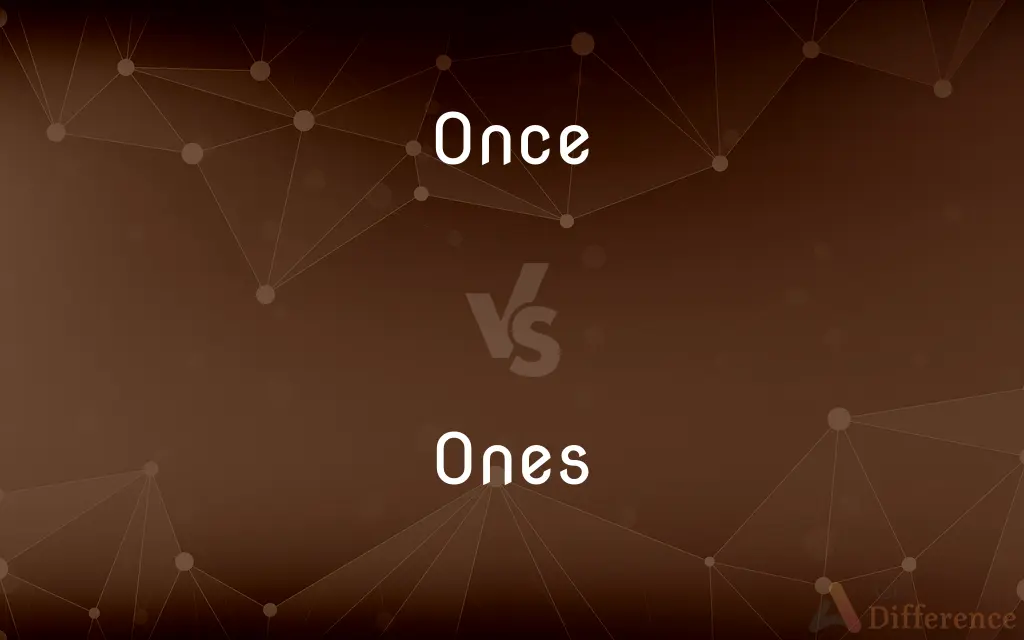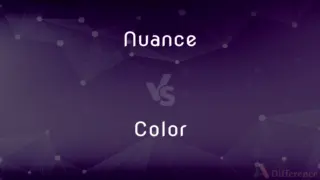Once vs. Ones — What's the Difference?
By Urooj Arif & Maham Liaqat — Updated on March 29, 2024
"Once" refers to something happening a single time, while "ones" is the plural of "one," indicating multiple instances or items.

Difference Between Once and Ones
Table of Contents
ADVERTISEMENT
Key Differences
"Once" is an adverb used to describe an action or event that occurs one time only, emphasizing the singularity of the occurrence. It highlights the limited frequency with which something happens, often underscoring the uniqueness or rarity of the event. Whereas "ones" is a plural noun form of "one," used to refer to specific objects, people, or instances among a group, indicating selection or distinction from others.
Using "once" in a sentence sets a clear expectation about the frequency of an action or event, suggesting it either has occurred or will occur no more than one time. This can be important in narratives or instructions where the timing and frequency of actions are crucial. On the other hand, "ones" is utilized to differentiate or emphasize particular entities within a larger group, often in response to a selection or categorization process. It is a way of specifying without directly naming the entities.
"Once" can also convey a sense of nostalgia or reference a specific point in the past, adding depth to storytelling or historical accounts. It can imply that something was different or possible only at that particular time. Whereas "ones" can be used in contexts requiring clarification or when making choices, such as picking out items based on certain criteria. It helps in making comparisons or expressing preferences.
In literary or poetic contexts, "once" often introduces scenarios or conditions that are pivotal to the development of a plot or theme, serving as a gateway to transformative events or revelations. Meanwhile, "ones" can signify inclusion or exclusion within a narrative, focusing attention on specific characters, items, or ideas that play key roles in the unfolding story or argument.
The use of "once" can evoke a sense of immediacy or urgency, as it points to a one-time opportunity or requirement. This can influence how actions or decisions are perceived, adding a layer of significance to the moment at hand. Conversely, "ones" implies a selection process among many, reflecting a degree of consideration and choice that adds nuance to decision-making or descriptions.
ADVERTISEMENT
Comparison Chart
Definition
An adverb indicating something happens a single time.
Plural form of "one," referring to multiple instances or items.
Usage Context
Describes frequency or timing of events.
Specifies or distinguishes among a group.
Implication
Singularity, rarity, or a specific moment in time.
Selection, differentiation, or inclusion among others.
Role in Narrative
Sets expectations, introduces pivotal scenarios.
Highlights choices, focuses on specifics.
Effect on Communication
Adds urgency, nostalgia, or specificity.
Clarifies, contrasts, or emphasizes selections.
Compare with Definitions
Once
"Once" signifies an action happening one time only.
I once visited Paris in the spring.
Ones
"Ones" refers to specific items or people in a group.
Of all the dresses, I prefer the red ones.
Once
It can express something happening at a specific moment in the past.
Once upon a time, there was a mysterious kingdom.
Ones
"Ones" helps avoid repetition by substituting for previously mentioned nouns.
I like these apples more than those ones.
Once
It can mean as soon as or whenever.
Once you hear the bell, start the exam.
Ones
"Ones" contrasts items or categories within discussions.
The successful ones aren't always the ones you'd expect.
Once
"Once" might also imply at a past time, suggesting nostalgia.
We were young once and full of dreams.
Ones
It can be used for emphasizing particular instances.
The ones I chose were too expensive.
Once
"Once" is used to indicate the first occurrence of an event.
Once the software is installed, you can begin using it.
Ones
It specifies a selection based on criteria.
We need the ones that can withstand the heat.
Once
One time only
Once a day.
Ones
Of the same kind or quality
Two animals of one species.
Once
At one time in the past; formerly.
Ones
Being a single entity, unit, object, or living being
I ate one peach.
Once
At any time; ever
Once known, his face is never forgotten.
Ones
Characterized by unity; undivided
They spoke with one voice.
Once
By one degree of relationship
My first cousin once removed.
Ones
Forming a single entity of two or more components
Three chemicals combining into one solution.
Once
A single occurrence; one time
Once will have to do. You can go just this once.
Ones
Being a single member or element of a group, category, or kind
I'm just one player on the team.
Once
As soon as; if ever; when
Once he goes, we can clean up.
Ones
Being a single thing in contrast with or relation to another or others of its kind
One day is just like the next.
Once
Having been formerly; former
The once capital of the nation.
Ones
Occurring or existing as something indefinite, as in time or position
He will come one day.
Once
(frequency) One and only one time.
I have only once eaten pizza.
Ones
Occurring or existing as something particular but unspecified, as in time past
Late one evening.
Once
(temporal location) Formerly; during some period in the past.
He was once the most handsome man around.
I once had a bicycle just like that one.
Ones
(Informal) Used as an intensive
That is one fine dog.
Once
At any time; ever.
If the facts once became known, we'd be in trouble.
Ones
Being the only individual of a specified or implied kind
The one person I could marry.
The one horse that can win this race.
Once
(obsolete) One day, someday.
Ones
The cardinal number, represented by the symbol 1, designating the first unit in a series.
Once
(mathematics) Multiplied by one: indicating that a number is multiplied by one.
Once three is three.
Ones
A single person or thing; a unit
This is the one I like best. Of her many books, the best ones are the last two.
Once
As soon as; when; after.
We'll get a move on once we find the damn car keys!
Once you have obtained the elven bow, return to the troll bridge and trade it for the sleeping potion.
Once he is married, he will be able to claim the inheritance.
Ones
A one-dollar bill.
Once
The ounce.
Ones
Plural of one
Once
For one time; by limitation to the number one; not twice nor any number of times more than one.
Ye shall . . . go round about the city once.
Trees that bear mast are fruitful but once in two years.
Ones
(sports) A senior or first team (as opposed to a reserves team).
Once
At some one period of time; - used indefinitely.
My soul had once some foolish fondness for thee.
That court which we shall once govern.
Ones
The cells located on the ground floor.
Once
At any one time; - often nearly equivalent to ever, if ever, or whenever; as, once kindled, it may not be quenched.
Wilt thou not be made clean? When shall it once be?
To be once in doubtIs once to be resolved.
Ones
Plural of one
Once
Belonging to some prior time;
Erstwhile friend
Our former glory
The once capital of the state
Her quondam lover
Ones
Obsolete form of one's
Once
On one occasion;
Once I ran into her
Ones
Once.
Once
As soon as;
Once we are home, we can rest
Once
At a previous time;
Once he loved her
Her erstwhile writing
Common Curiosities
How is "ones" used in sentences?
"Ones" is used to refer to specific entities or items among a group, indicating selection or distinction.
Can "once" be used to imply nostalgia?
Yes, "once" can imply nostalgia, referring to a time in the past often with a hint of longing or reminiscence.
What is the function of "ones" in communication?
"Ones" functions to specify, clarify, or emphasize particular items or individuals among others, aiding in precision and selection.
What does "once" mean?
"Once" refers to an event or action occurring one single time, emphasizing its singularity or specific timing.
Does "once" have different meanings based on context?
Yes, "once" can mean different things based on context, such as a single occurrence, a past condition, or upon a particular action happening.
Is "once" only related to time?
While primarily related to time and frequency, "once" can also convey conditions, such as in "once ready" or "once completed."
Can "ones" refer to people as well as objects?
Yes, "ones" can refer to both people and objects, depending on the context and the noun it replaces or refers to.
How does "ones" facilitate conversation?
"Ones" facilitates conversation by allowing speakers to refer back to previously mentioned items or ideas without redundancy, making communication more efficient.
How do "once" and "ones" affect the clarity of communication?
"Once" adds specificity regarding timing and frequency, while "ones" enhances clarity by identifying or distinguishing specific entities, improving the precision and understanding of the message.
What is "ones" mean?
Ones refers to specific items or people in a group.
Share Your Discovery

Previous Comparison
Nuance vs. Color
Next Comparison
Jump vs. SkipAuthor Spotlight
Written by
Urooj ArifUrooj is a skilled content writer at Ask Difference, known for her exceptional ability to simplify complex topics into engaging and informative content. With a passion for research and a flair for clear, concise writing, she consistently delivers articles that resonate with our diverse audience.
Co-written by
Maham Liaqat













































